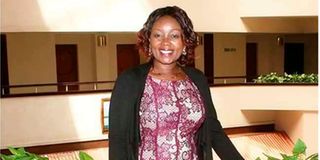State to establish policies protecting widows

Dianah Kamande, the founder of Come Together Widows and Orphans Organisation (CTWOO). PHOTO | COURTESY
What you need to know:
- Gender CS Prof Margaret Kobia says deliberate actions to provide solutions on the plight of widows and orphans is needed.
- CTWOO founder Diana Kamande applauds government funds among them Women Enterprise Fund (WEF) for supporting the vulnerable in society.
- UN Women Country Representative Anna Mutavati notes that many widows do not have the knowledge about their rights therefore leading to many inheritance cases being thrown out.
Many widows in Kenya are still disinherited, discriminated and have to endure harmful cultural practices, a gross violation of their human rights.
The State now seeks to put in place policies, legislative and practical responses to eliminate the systemic violation of widows’ rights that result in poverty and making them vulnerable to violence.
Public Service and Gender Cabinet Secretary Prof Margaret Kobia, while speaking during an event organised by Come Together Widows and Orphans Organisation (CTWOO) in a Nairobi hotel recently, said there is need for deliberate actions to provide solutions on the plight of widows and orphans.
“As the ministry responsible for the promotion of gender equality and women empowerment, I fully understand the plight of widows and orphans,” said Prof Kobia.
Socio-economic roles
The CS added that the government recognises the critical need to support widows’ key socio-economic roles in their families and in the wider community as sole caregivers of children and other dependents, often economically and sexually exploited.
She said the government is working with stakeholders to review existing policies and legal frameworks to strengthen them.
“Among the laws that will be reviewed include the Law of Succession Act, the Marriage Act, the matrimonial Properties Act, the Protection against Domestic Violence Act,” said Prof Kobia.
The founder of CTWOO Ms Diana Kamande applauded the government funds among them Women Enterprise Fund (WEF), Youth Enterprise Fund, National Government Affirmative Fund (NGAAF) and Uwezo Funds for increasing the loan repayment period for the vulnerable in society.
This, she said, is a sign the government understands that businesses were negatively affected by Covid-19 pandemic.
“Through these government funds, there has been notable progress since many widows can now engage in decent work and businesses,” she said.
Ms Kamande thanked the office of the Ombudsman, which she revealed had taken more than 50 cases and Fida-Kenya, which is currently handling 150 cases pro-bono for widows.
Stigma
Ms Heather Ibrahim-Leathers, founder of Global Fund Widows (GFW), the largest NGO working towards empowering widows around the world, addressed the gathering virtually and appealed to the Kenyan government to consider putting forth friendly policies and resolutions protecting widows to alleviate their suffering.
UN Women Country Representative Ms Anna Mutavati noted that some widows do not know their rights, leading to many inheritance cases being thrown out. She added that many tend to give in to pressure due to stigma and that is why organisations like CTWOO need to provide social capital that they desperately need.
“Information and campaigns towards orphans’ rights and widows’ rights need to be rolled out at national and county levels. Law enforcement agencies need training on what to do to protect widows and hold their hands, especially on matters regarding inheritance,” said Ms Mutavati.
She regretted that many widows in Africa do not have the same inheritance rights as their male counterparts, which means they are normally stripped off their land, property, rights and access to their own children.





